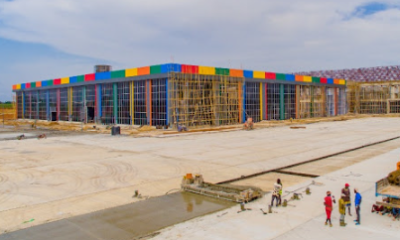Politics
Tunde Bakare blasts Buhari, FG over Chibok, Dapchi girls abduction
Published
7 years agoon
By
Olu Emmanuel
Tunde Bakare, Senior Pastor of the Latter Rain Assembly, Lagos, at the fourth year remembrance ceremony of the abduction of 276 girls from the Government Science Secondary School, Chibok, Borno State, in 2014, chided President Muhammadu Buhari and the Federal Government for the lackadaisical attitude towards the protection of the girl child in Nigeria which made it facile for the Boko haram terrorists to strike a second time in abducting the Dapchi School girls four years after the Chibok episode.
In a keynote address at the fourth anniversary lecture in commemoration of the Chibok abduction, Bakare bemoaned that the country allowed a similar incident in Dapchi, Yobe State nearly four years later, was an indication that it never learns from the past. He made a strong case for the return of Leah Shaibu who is still in the captivity of the Boko Haram terrorists because of her unintimidating belief in Christian faith.
Bakare declared: “From the recent events at Government Girls Science Technical College, Dapchi, it is obvious that the dark chapter that was opened four years ago today is still open. While I rejoice with the students who were returned and their families, even as I remember and extend my heartfelt condolences to the families of the girls who lost their lives, permit me to use this occasion to demand that Leah Sharibu, who is still being held by the terrorists, be brought back home alive and unhurt, not just because her parents and the Nigerian people of all creeds cannot wait to see her back, but also because of what she now represents for the Nigerian nation.
“Leah Sharibu has become the symbol of the validity of the Nigerian constitution, Section 38 of which guarantees religious freedom; therefore, her safe return is synonymous with the constitutional stability and sanctity of the Nigerian state.
“The Nigerian government must do all that is necessary to bring her back alive. Our hearts go out to her parents and our prayers go out to her wherever she is at the moment and we affirm, in the spirit of hope that, very soon, we will see her safely returned to us.”
He maintained: “The fact that the Dapchi episode happened four years after the Chibok incident and one year to elections, just as it was in the Chibok case, is evidence of an alarming national malady. There is something wrong when a nation is twice bitten, yet never shy with respect to the safety and security of its girl child. There is something undeniably wrong when the girl child repeatedly becomes the bargaining instrument in negotiation deals between the government and terrorists. There is something absolutely wrong when the girl child becomes a pawn in a political chess game in which the major political parties seek to score political points.
“One of the key indicators of stability or the lack thereof in a nation is the state of its girl child because she is often the most vulnerable in a destabilised polity. The problematic issues encountered by the girl child in any society are symptoms of an underlying malady which must be diagnosed. In essence, the brazen assault on the girl child in the Nigerian state is a clear indication that our nation is sick. It is therefore with the intent to uncover the nature of this malady that I will begin by examining the issues affecting the girl child in Nigeria, establishing the causes of such a dire state, and then concluding with implementable solutions that encapsulate a renewal of our commitment to undoing damage done and laying a foundation for a just and good society.”
Bakare further lamented: “Domestic violence has become a frequent feature in news reports and, every now and then, we hear or read such outrageous stories as: the commercial motorcyclist in Nasarawa who beat his wife “to stupor” allegedly because she accused him of snoring; the man who beat his pregnant wife to death in Abuja; or the man convicted of stabbing his wife to death for allegedly infecting him with HIV.
He observed that, “Statistics indicates that at least “25 per cent of ever-married women age 15-49 report…having experienced emotional, physical, or sexual violence from their spouse”. This would suggest that daughters in many homes in Nigeria may have been programmed to anticipate a violent marital experience going by the experiences of their mothers.”
Bakare regretted: “From observing and being conditioned by violence against an adult woman, the girl child has become, herself, a victim of heart-breaking cases of violence, particularly, in the form of sexual assault by adult males.”
He highlighted that, “Findings from a 2014 survey indicate that 1 in 4 girls surveyed reported experiencing sexual violence. This is rather conservative considering the fact that much of such abuse is not reported. In 2016, the Nigerian Stability and Reconciliation Programme reported 65cases of sexual violence across the country in just three months, and the perpetrators included “a family member, friend, or community member…as well as…strangers.” From the rape of a 6-month-old baby by a man in Kano State to the gang rape of a 1-year-old baby by three men in Katsina State, the reports are extremely disturbing.”
Mrs. Najartu Mohammed, Chairperson of the event, demanded the federal government to do all in its power to ensure the protection of the girl child.
It was noted that while some of the girls initially escaped, 107 of them were later released or walked their ways into freedom while 112 are still held captive.
You may like


Flight operations at Ebonyi’s Chuba Okadigbo Airport set to begin in November


SSANU, NASU members block UNILAG gate over withheld salaries


APC has strayed from its values –Tunde Bakare


The costly impotence of Buhari’s presidency


FG did not suspend removal of fuel subsidy because of 2023 elections – Femi Adesina


President Muhammadu Buhari on why he didn’t sign the electoral bill passed in NASS
Trending

 Business6 days ago
Business6 days agoTelecom inflation falls to 2.3% amid price freeze, regulatory tensions

 Business6 days ago
Business6 days agoNigeria’s auto industry stagnates over policy delay, LCCI warns

 Politics4 days ago
Politics4 days agoJustice ministry plans more trainings for staff in Delta
- Crime5 days ago
IG Egbetokun bans police from making arbitrary arrests, detaining youths, collecting phones, and conducting searches

 Trending Stories1 week ago
Trending Stories1 week agoTravel vlogger Tayo Aina shares why he moved to Portugal after spending $150K on St. Kitts citizenship

 Latest1 week ago
Latest1 week agoINEC chairman is alive, Oyekanmi tells Nigerians

 Business3 days ago
Business3 days agoNCC’s regulatory reforms, strategies set to redefine Nigeria’s telecom industry

 Sports1 week ago
Sports1 week ago3rd edition of Seyi Tinubu Table Tennis Tourney shifted to December 20




